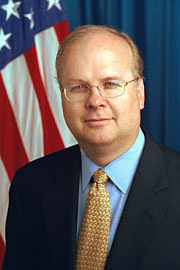Karl Rove refuses to testify before House Judiciary Committee
Thursday, July 10, 2008

Karl Rove, who served as Deputy Chief of Staff to United States President George W. Bush before resigning last year, failed to appear in front of the House Judiciary Committee today, refusing to testify about allegations of misusing his political power.
The congressional panel is trying to determine if Rove had a connection with the prosecution of Don Siegelman, former Democratic governor of Alabama. The committee is also investigating allegations that the former White House adviser dismissed nine federal prosecutors seen as political opponents. Rove has denied ever influencing the decisions of the Department of Justice.
In May, the panel subpoenaed Rove in an attempt to force him to offer testimony. He was scheduled to appear at a committee hearing today, but his lawyer Robert D. Luskin made it clear that he would not attend. Luskin argued that his client was "immune" to the subpoena because of executive privilege, which gives executive officials the right to resist a search from the other two branches of government.
In a letter written to the committee on Wednesday, Luskin said that Rove is "constitutionally immune from compelled congressional testimony", adding that "threatening Mr. Rove with sanctions will not in any way expedite the resolution of the issue." He said Rove would be willing to talk about the Siegelman case as part of an "informal interview", without a transcript and without taking an oath.
Members of the Judiciary Committee argued that executive privilege is not a valid reason to ignore a subpoena. California Rep. Linda Sanchez, who chairs the Subcommittee on Commercial and Administrative Law, said at the hearing, "We are unaware of any proper legal basis for Mr. Rove's refusal to even appear today as required by the subpoena." She cited United States v. Nixon and Clinton v. Jones as legal precedents.
Sanchez, along with the Judiciary Committee chairman, Michigan Rep. John Conyers, said that Rove's refusal to testify could result in prosecution for being in contempt of Congress. "A refusal to appear in violation of the subpoena could subject Mr. Rove to contempt proceedings, including statutory contempt under federal law and proceedings under the inherent contempt authority of the House of Representatives," Conyers and Sanchez wrote.
If the Judiciary Committee votes to pursue these contempt charges against Rove, they would go to the floor of the House, where Speaker Nancy Pelosi would decide whether to proceed with a final vote. The House has already held two of Bush's advisers in contempt for defying a subpoena: White House Chief of Staff Josh Bolten and former White House Counsel Harriet Miers. Their case is currently in federal court.
Republicans have accused Democrats of using these cases as political weapons against George W. Bush. Rep. Chris Cannon, a Republican from Utah, said that "if the majority was serious about getting to the bottom of this issue", they would have accepted Rove's offers to discuss the issue on his terms, informally and without a transcript. "The fact that it hasn't is proof that their efforts amount to a partisan stunt," said Cannon.
Sources
edit- "Rove ignores committee's subpoena, refuses to testify" — CNN, July 10, 2008
- Ben Evans. "Rove ignores subpoena, refuses to testify on Hill" — Associated Press, July 10, 2008
- Dan Robinson. "Former Bush Aide Rove Defies Congressional Subpoena" — Voice of America, July 10, 2008
- John Bresnahan, The Politico. "Rove Contempt Vote Not To Come Until Later This Month" — CBS News, July 10, 2008